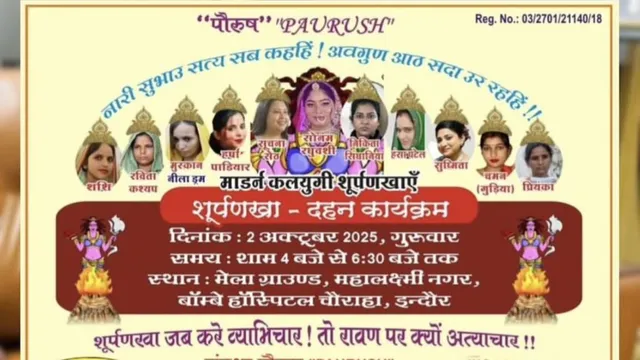- By Chetna Shree
- Sun, 28 Sep 2025 05:00 PM (IST)
- Source:JND
Surpanakha Dahan: In a major move, the Indore Bench of the Madras High Court intervened to stop a controversial Dusshera event, named as “Surpanakha Dahan”, which intended to replace the traditional effigy of Ravana with those of 11 women facing criminal charges. Among the women named were Sonam Raghuvanshi, accused of murdering her husband, Raja Raghuvanshi, Muskan, accused in the notorious “blue-drum” murder case in Merrut and others.
The Court on Saturday prohibited the burning of effigies, calling the act unconstitutional and a violation of democratic principles, NDTV reported.
ALSO READ: Delhi Baba Chaitanyanand Posed As UN And BRICS Representative, Asserted PMO Links To Enjoy Influence
What Is Surpanakha Dahan?
- The Dusshera event, Surpanakha Dahan, was organised by Paurush, a men’s rights group based in Indore that claims to advocate for victims of wife abuse.
#Watch | ‘Ravan Dahan’ has taken a controversial turn in Indore, where Paurush, a group working for the cause of men who are victims of wives’ abuse will be setting alight an 11-headed effigy of Surpanakha with faces of women accused of killing their husbands and children.… pic.twitter.com/U3FRbLRsF7
— The Daily Jagran (@TheDailyJagran) September 19, 2025
- The men’s rights group had planned to burn a large effigy with 11 faces, each depicting a woman accused in various criminal cases, such as domestic murder, fraud and drug trafficking.
- Among those named were Sonam Raghuvanshi, accused of murdering her husband in Meghalaya, and Muskan, implicated in the infamous “blue drum” murder case in Meerut.
- The list also included women accused of crimes across India, ranging from fraud and cybercrimes, such as Nikita Singhania and Sushmita, to child trafficking (Shashi from Firozabad) and liquor smuggling (Hansa from Dewas).
What Is The Controversy?
The controversy against Surpanakha Dahan intensified when Sonam’s mother, Sangeeta Raghuvanshi, filed a petition in the High Court on September 25, stating that her daughter is still undergoing trial and had not been convicted by any court. She further argued that publicly burning Sonam’s effigy amounted to “defamation and mental harassment.
What Did The Court Say?
The Indore Bench of the Madras High Court stated, “Even if a person is facing criminal charges, burning their effigy and publicly defaming them violates the Constitution and the law.”
The Court issued an order on Saturday, prohibiting the burning of effigies, emphasising that such symbolic punishments are “completely unacceptable in a democracy.”
What Did Paurush Say?
Ashok Dashora, the president of Paurush, said that the event was not intended to “insult any woman”, but rather to symbolise that evils know no gender. “If Ravana represented wrongdoing in his time, then today’s society must confront modern-day ‘Surpanakhas,” he further explained.
ALSO READ: Delhi Govt Inaugurates Nand Nagri Flyover, Promises Faster Commutes In North East Delhi
Following the court’s order, he stated, “We respect the judiciary. Now that the ban is in place, the effigy will not be burned.” However, the group is considering appealing the single-bench order.

